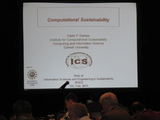National Science Foundation holds Sustainable IT Workshop
Leveraging IT to Support Sustainability Projects
A Workshop on Sustainability & IT
About 60 leading researchers, program managers, and others gathered in Washington, DC, last Thursday and Friday to discuss new fundamental CSE research opportunities that will meet important enabling needs as the nation and world seek long-term sustainable technologies and behaviors. Thistwo-day meeting, co-sponsored by NSF’s CISE Directorate and the Computing Community Consortium, sought to go beyond routine uses of information technology to identify high-risk, high-reward research directions in sustainability that may not yet have received adequate attention or funding.
The workshop comprised three sessions with plenary talks followed by breakout discussions and report-backs, as well as a fourth session that served as an integration/wrap-up period. The NSF’s Tim Killeen helped set the stage at the outset by describing the Foundation-wide, multi-year Science, Engineering, and Education of Sustainability (SEES) initiative. Thursday morning breakouts focused on IT areas, such as cyber-physical systems, human-computer interaction, big data (including security and privacy), modeling and simulation, etc. That afternoon, participants looked at application domains, i.e., energy, transportation, environment/climate, etc. And the next morning, three topics served as the basis for the breakout groups: the data deluge; transparency of models; and systems integration.
Some key highlights:
- We learned about several large-scale projects that are meeting with success because computer scientists have been brought together with application domain experts rather effectively. For example, Carla Gomes (Cornell) described her Expeditions project on computational sustainability broadly; Vipin Kumar (U of Minnesota) presented on his Expeditions project on climate modeling; and Dave Waltz discussed his Con Edison-funded work on machine learning and the electric grid.
- We also heard from application domain experts who clearly articulated the role of basic computing research in their areas. For example, Michael Meyer(Georgia Tech) — a transportation systems engineer — gave an excellent overview of the transportation system, including where we are today, where we could be in the future, and how IT research is critical for facilitating/enabling this transition.
- And Bill Tomlinson (UC-Irvine; author of “Greening for IT”) gave a fabulous talk coupling technology with basic human needs, such as happiness and safety.
Several new ideas emerged from the discussions, such as the sustainability of sustainable data; the breadth of the sustainability space and the richness of the computational problems; and the challenges particularly in transportation.
The organizing committee hopes to have a final report describing the sustainability space — and particularly the role of CSE research — in about a month’s time. Stay tuned! In the meantime, check out the workshop website which includes the full agenda, speakers’ slides, and two-page white papers from many of the participants, along with a wealth of other info. And we’ll have videos of the plenaries and breakout report-backs posted shortly, too.
Special thanks to my fellow organizing committee members for putting the workshop together on a short time fuse: Bob Sproull (Oracle; chair); Randy Bryant(CMU; co-chair); Doug Fisher (Vanderbilt); Carla Gomes (Cornell); Krishna Kant(Intel & NSF); Bill Rouse (Georgia Tech); Prashant Shenoy (UMass-Amherst); andDave Waltz (Columbia). And thanks also to everyone who contributed their time and ideas as participants!
(Contributed by Erwin Gianchandani, CCC Director)
Posted: February 14, 2011, 5:19 PM
